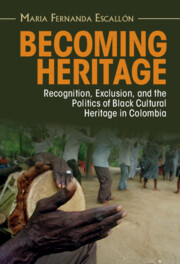Book contents
- Becoming Heritage
- Afro-Latin America
- Becoming Heritage
- Copyright page
- Dedication
- Contents
- Figures
- Preface
- Acknowledgments
- Abbreviations
- Introduction
- 1 A New Framework of Legitimacy
- 2 Institutionalizing Heritage
- 3 Heritage in the Face of Death
- 4 Palenqueras and the Trap of Visibility
- Epilogue
- Bibliography
- Index
3 - Heritage in the Face of Death
Published online by Cambridge University Press: 06 April 2023
- Becoming Heritage
- Afro-Latin America
- Becoming Heritage
- Copyright page
- Dedication
- Contents
- Figures
- Preface
- Acknowledgments
- Abbreviations
- Introduction
- 1 A New Framework of Legitimacy
- 2 Institutionalizing Heritage
- 3 Heritage in the Face of Death
- 4 Palenqueras and the Trap of Visibility
- Epilogue
- Bibliography
- Index
Summary
This chapter examines how one of the most iconic elements of Palenque’s culture, its funerary ritual lumbalú, has been depicted in academia and public policy. I contrast these depictions with community members’ lived experiences of death before and after the untimely passing of my host family member, Cecilia. This contrast highlights how attention has been paid to the cultural and historical elements of Palenque’s culture, often to the detriment of addressing the many issues that make life in Palenque so difficult. The declaration unequivocally brought more attention to Palenque, raising public awareness about poverty and discrimination there. However, an analysis of the language of heritage recognition highlights how Black lives have been showcased and yet continuously devalued in Colombia’s multicultural regime.
Bringing attention back to Palenqueros’ bodies, to the root causes of Palenqueros’ precarity, and to the emotional landscape of loss, I argue that academic heritage narratives produce a sort of cognitive dissonance around death. These formal scholarly stories engage in a process I identify as analytical flattening, focusing on commemoration rituals rather than human life and representing the deaths of Black people as if they are disembodied cultural artifacts, void of humanity. By focusing on the emotional toll on those who survive, I reveal how Palenqueros’ deaths are part of a broader lived experience of racial marginalization, one with which heritage narratives have yet to reckon.
- Type
- Chapter
- Information
- Becoming HeritageRecognition, Exclusion, and the Politics of Black Cultural Heritage in Colombia, pp. 118 - 140Publisher: Cambridge University PressPrint publication year: 2023



